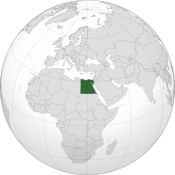Mansour announces election plans for Egypt after violence and protests
Tuesday, July 9, 2013

Last night, Adly Mansour, the interim leader of Egypt, announced plans to reform Egypt's constitution and hold a new round of parliamentary and presidential elections. The interim president also announced a judicial investigation into yesterday's shooting of at least 51 supporters of deposed president Mohamed Morsi.
Mansour plans to form a panel within fifteen days to review and suggest changes to the now-suspended constitution. Those amendments would be voted on in a referendum within four months. Parliamentary elections would then be held, perhaps in early 2014, followed by presidential elections upon the forming of a new parliament.
Yesterday in Cairo, protestors supporting Mohamed Morsi and the Muslim Brotherhood were shot outside the Presidential Guard barracks, where pro-Morsi supporters believe the former president is being kept under arrest. The Muslim Brotherhood claim 53 people died, while the health ministry claim 51 people died and 435 were injured. The Muslim Brotherhood claim the attack was unprovoked and those gathered were praying. Colonel Ahmed Mohammed Ali, spokesman for the army, said the group had attacked security forces and were armed with "large quantities of firearms, ammunition and Molotov cocktails". The Muslim Brotherhood claimed children were killed in the conflict but Colonel Ali claims the photos being used by the Muslim Brotherhood are actually photos from Syria in March. Colonel Ali also stated two policemen and a soldier were killed.
One of the survivors, Mohamed Saber el-Sebaei, told journalists he was praying when the confrontation started: "Just before we finished, the shooting started. The army units that were standing in front of the Republican Guard headquarters first started shooting teargas, then live ammunition above people's heads [...] I was taking cover with another guy behind some rubble and I felt something hit my head. I held my prayer mat in my hand and I started to cover my head with it. But I couldn't stop the bleeding because there was so much blood."
The shooting of 51 people on Monday follows violence last week which killed 36 people in Cairo. The Muslim Brotherhood have asked supporters to protest non-violently and support peaceful vigils. Some within the Muslim Brotherhood movement have suggested they may be outlawed, as they were under Hosni Mubarak.
British Foreign Sectretary William Hague said: "It is crucial that there is a swift return to democratic processes in Egypt. All sides of the political spectrum should work together for the sake of the country's political and economic future."
Former British Prime Minister Tony Blair said the intervention by the army was necessary to prevent "chaos", and said the protests that led to the downfall of Morsi are due to dissatisfaction with the efficacy of government: "When governments don't deliver, people protest. They don't want to wait for an election." Blair also blamed the "ideology and intolerance of the Muslim Brotherhood": "People felt that the Brotherhood was steadily imposing its own doctrines on everyday life". Blair advised Western governments to "engage with the new de facto power and help the new government make the changes necessary, especially on the economy, so they can deliver for the people. In that way, we can also help shape a path back to the ballot box that is designed by and for Egyptians".
Related news
- "Egyptian military issues ultimatum to Morsi" — Wikinews, July 1, 2013
Sources
- "Egypt unrest: Interim leader outlines election timetable" — BBC News Online, July 8, 2013
- Ian Black and Patrick Kingsley. "'Massacre' of Morsi supporters leaves Egypt braced for new violence" — The Guardian, July 8, 2013
- Patrick Kingsley. "At least 51 protesters killed in Egypt as army opens fire 'like pouring rain'" — The Guardian, July 8, 2013
- Martin Chulov. "Muslim Brotherhood says 'we must raise the stakes' as clerics try to contain violence" — The Observer, July 6, 2013
- Tony Blair. "Democracy doesn't on its own mean effective government" — The Observer, July 6, 2013

